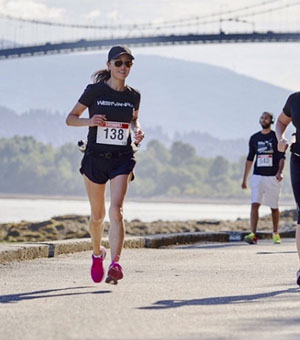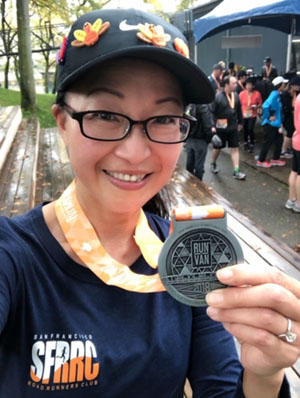Alisa’s Story: Survivor, Marathoner, Mother
 Author: Laurel Skurko, Marketing Director, UCSF Radiology and Biomedical Imaging
Author: Laurel Skurko, Marketing Director, UCSF Radiology and Biomedical Imaging
When Alisa Brozinsky was just 34 years old, she was diagnosed with breast cancer. To save her life she opted for a mastectomy, chemotherapy, and reconstruction. That was nearly 20 years ago. Today, she remains cancer-free. She’s also a marathoner, a mother, and a peer support counselor for the UC San Francisco’s The Ida & Joseph Friend Cancer Resource Center.
Maybe it’s because she has been there, she has gone through the paces, that she understands cancer patients and what they are going through. Perhaps her story is what helps her acknowledge the fears and challenges of battling cancer—from diagnosis to remission—so well.
UCSF wasn’t Brozinsky’s first stop. She had her biopsy surgery at another hospital in the Bay Area because her husband’s cousin was able to get her in quickly. The biopsy went smoothly, but the subsequent consultation with an oncologist wasn’t an ideal experience. This particular oncologist treated her not like a person, she says, but like a case number. He regaled her with stats and data, and it was more than an overwhelmed young woman could handle.
“When you are initially diagnosed, you wonder if you are going to die or not,” says Alisa. She left the oncologist’s office more scared than she’d come in—her head swimming in numbers. Numbers weren’t helping. Numbers weren’t something she could control. In that moment, Alisa knew that what she wanted and needed was some semblance of power.
“I couldn’t control the fact that I got cancer,” says Alisa. “But I could control who would help me deal with it. I could control who was going to be on my team and what treatment options I would agree to.”
So, she took the next step in searching for her best team. Because her form of cancer was aggressive, Alisa chose to fly across country for her mastectomy, to New York’s Memorial Sloan Kettering, where a friend had been able to help her get in quickly. However, she didn’t want to stay in New York or return frequently for chemotherapy, and she already knew of UCSF by reputation. As a leader in research, UCSF Radiology was equipped to give her interventional treatment.
“The reputation of the hospital and the experience of the doctors was important to me,” says Alisa. Soon she discovered one of UCSF’s own, and one of the nation’s top oncologists specializing in breast cancer, Hope Rugo, MD.
 “For some reason, when you’re going through something like that, you take solace in the smallest of things. I liked that her name was Hope, too,” says Alisa. “Right off the bat, I felt like I was in the most capable of hands. I was also in a facility that, if things turned for the worst, had put the years and years of work and research in on understanding and treating breast cancer. I felt they would be equipped to handle whatever came my way.”
“For some reason, when you’re going through something like that, you take solace in the smallest of things. I liked that her name was Hope, too,” says Alisa. “Right off the bat, I felt like I was in the most capable of hands. I was also in a facility that, if things turned for the worst, had put the years and years of work and research in on understanding and treating breast cancer. I felt they would be equipped to handle whatever came my way.”
That she was in good hands was a feeling that followed Alisa throughout the process, from that initial consultation, through the numerous visits to the infusion center, to radiology, and with every interaction with the staff at the UCSF Carol Franc Buck Breast Care Center.
With a 20-year-cancerversary on the horizon, and as the mother of a daughter, Alisa is also glad for some changes that have occurred in cancer care. “When I was at the infusion center undergoing my chemotherapy, there weren’t many young people being treated,” says Alisa. “That seems to have changed. I think many more young people are getting diagnosed early.”
Young people, as she was, face special challenges when dealing with cancer, including the possibility of infertility. “Back then, they were focused on saving your life. Now, there is a lot more focus on the quality of life issue, too.” That can mean radiologists and other cancer team members can help women make appointments with endocrinologists and fertility specialists who can advise on freezing eggs or other fertility preserving options.
For cancer patients and survivors, sometimes the more you know, the better. Which is why UCSF Radiology joined forces with the UCSF Helen Diller Family Comprehensive Cancer Center to create educational opportunities designed to open the dialogue about BRCA gene mutations and how they affect health outcomes. Alisa attended one of these events.
